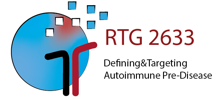MD B10: Testing ion channel inhibitors in the human skin organ culture model for pemphigus vulgaris
Pemphigus vulgaris (PV) is an organ-specific autoimmune bullous disease that affects the mucous membranes and/or skin. It is caused by IgG autoantibodies that primarily target desmoglein 3 (dsg3) and/or desmoglein 1 (dsg1). Desmogleins are decisive components of cell adhesion within the skin. In PV, anti-dsg1/3 autoantibodies disrupt the adhesion between keratinocytes, leading to the separation of skin cells.
The process by which intraepidermal blisters develop is called acantholysis. Clinically, PV is characterized by flaccid blisters and partially crusted, painful erosions on the skin and/or mucous membranes. PV and other autoimmune blistering skin diseases can be potentially life-threatening. Current therapeutic approaches primarily focus on immunosuppressing the patient's immune system.
The aim of my research is to possibly identify ion channel inhibitors, tested in the human skin organ culture model (HSOC), as a new therapeutic option for PV. Using the HSOC model, I aim to evaluate the degree of split formation in the skin in response to various ion channel inhibitors through histological and direct immunofluorescence analyses.

- Projects
- 1st Generation
- 2nd Generation
- A: Defining Autoimmune Pre-Disease
- B: Targeting of Autoimmune Pre-Disease
- Associated projects
- Medical doctoral researcher projects
- Concluded projects
- Medical doctoral researchers
- MD A20: Molecular and cellular characterization of aging effects in liver and plasma in mice
- MD A21: Kinase activity profiling of autoantibody-mediated angiotensin II type 1 receptor signaling in endothelial and immune cells
- MD A22: Systemic lupus erythematosus and fibromyalgia syndrome – movement as a biomarker for pain perception
- MD A24: Unveiling PTX3: A novel biomarker in the pathogenesis and progression of bullous pemphigoid
- MD B8: Deciphering the signaling events in desmoglein 1 and 3 antibody-induced pathology to investigate possible impacts for the onset of new autoimmune reactions
- MD B9: Testing substances influencing the protein biosynthesis in the human skin organ culture model for pemphigus vulgaris
- MD B10: Testing ion channel inhibitors in the human skin organ culture model for pemphigus vulgaris
- MD B11: Nutritional treatment study to improve inflammatory IgG Fc glycosylation
- MD B12: Resting heart rate as a prognostic marker for fatigue in primary Sjoegren's syndrome
- MD B13: Deciphering the signaling events in BP180 antibody-induced pathology to investigate possible impacts for the onset of new autoimmune reactions
- MD B14: Selective depletion of antigen-specific autoantibodies by targeted degradation
- Medical doctoral researchers






